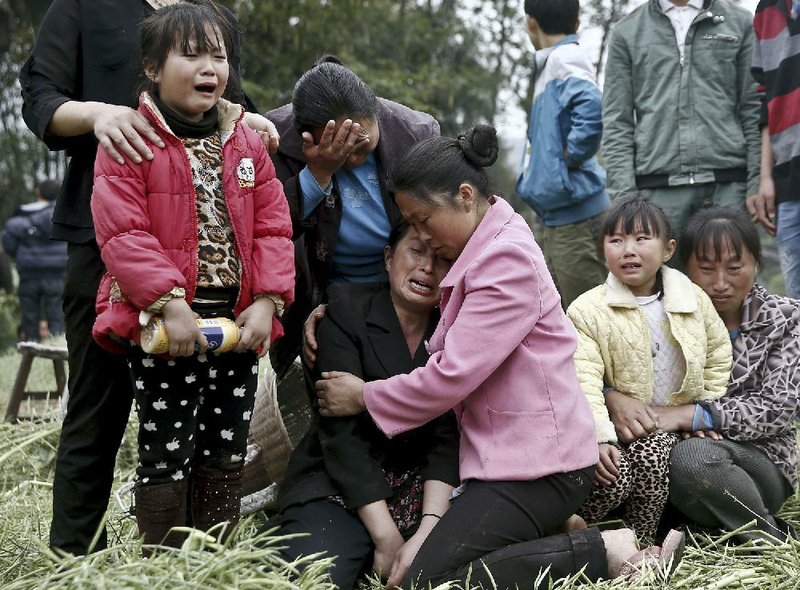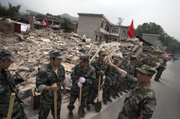BEIJING - China’s Premier Li Keqiang flew to the southwestern province of Sichuan to oversee relief work and robots and drones were hauled in to help rescuers struggling to reach villages devastated by Saturday’s earthquake.
The death toll from the temblor, the strongest to hit the country in three years, rose to 186 Sunday with more than 11,000 injured and at least 21 missing, according to the Ministry of Civil Affairs. It said 1.5 million people have been affected by the quake whose epicenter was Lushan County, about 1,000 miles southwest of Beijing.
The quake, measured at magnitude 6.6 by the U.S. Geological Survey, hit on the same fault line as a 7.9 earthquake that devastated nearby Wenchuan in May 2008. That was the country’s deadliest seismic event in more than three decades, leaving more than 90,000 people dead.
Li’s rush to the region a month into his first term as premier echoes that of his predecessor, Wen Jiabao, who flew to Wenchuan to reassure people that the Communist Party was doing everything possible to help. Thousands of military and armed police, firefighters, medical personnel, civilian relief workers and emergency response teams are in the region.
“The current priority is to save lives,” Li was quoted as saying by the official Xinhua News Agency. “We should grasp the golden period for saving lives and waste not a moment,” he said last night while leading a meeting in a tent in Lushan.
State television showed footage of Li meeting with local government officials and rescue teams Saturday evening, visiting hospitals, talking to the injured and climbing over the rubble of collapsed buildings. He returned to Beijing on Sunday afternoon after also going to the provincial capital, Chengdu, where eight people died.
“I was working in the field when I heard the explosions of the earthquake, and I turned around and saw my house simply flatten in front of me,” said Fu Qiuyue, a 70-year-old rapeseed farmer in Longmen.
Fu sat with her husband, Ren Dehua, in a makeshift shelter of logs and a plastic sheet on a patch of grass near where a helicopter had parked to reach their community of terraced grain and vegetable fields. She said the collapse of the house had crushed eight pigs to death. “It was the scariest sound I have ever heard,” she said.
The Ministry of Foreign Affairs said Sunday the country has the resources to cope with the disaster and doesn’t need international help for now, indicating the calamity isn’t as severe as the 2008 Wenchuan earthquake.
Relief teams flew in helicopters and dynamited through landslides Sunday to reach some of the most isolated communities, where rescuers in orange overalls led sniffer dogs through piles of brick, concrete and wood debris to search for survivors.
China dispatched five drones to capture images of the areas worst hit by the earthquake, including Baoxing, Taiping and Longmen townships, Xinhua said, citing the National Administration of Surveying, Mapping and Geoinformation. The Shenyang Institute of Automation sent robots that can enter ruins to detect life, it said.
Landslides cut off roads and knocked out power and phone systems, hampering efforts by relief teams to get to villages in the more remote parts of Lushan county. Emergency workers have restored electricity to some counties and a section of a highway linking Lushan to remote areas was repaired Sunday, Xinhua said.
About 18,000 soldiers and officers from the military, armed police forces and paramilitary reserve forces have been sent to the region, while the Ministry of Public Security has sent more than 2,300 firefighters to help with rescue work, according to Xinhua. Almost 1,000 medical workers and 202 medical vehicles have been dispatched, it said.
“Rescuers have been combing through more areas hit by the quake and while there’s been huge destruction of homes in some villages, we hope we won’t see much more loss of life,” Francis Markus, Beijing-based East Asia spokesman for the International Federation of Red Cross and Red Crescent Societies, said in a telephone interview Sunday.
Many residents complained that although emergency teams were quick to carry away bodies and search for survivors, they had so far done little to distribute aid. “No water, no shelter,” read a handwritten sign held up by children on a roadside in Longmen.
The government on Sunday earmarked $162 million for rescue and relief work, relocation of those affected by the earthquake, medical treatment, subsidies for victims’ families and repairing public facilities, Xinhua said.
“People are already starting to feel profoundly anxious about reconstruction of their houses and rebuilding their livelihoods,” Markus said. “It’s causing a great deal of worry.”
Tens of thousands of people moved into tents or cars, unable to return home or too afraid to go back as aftershocks continued to jolt the region.
Baoxing county, an isolated area that was one of the worst hit, was reached Sunday, and rescuers with sniffer dogs are searching for survivors, Xinhua reported, citing the Ministry of Public Security’s rescue headquarters in Lushan.
Longmen and Qingren townships were also badly affected, Xinhua said, citing Jin Zelin, an official with the provincial armed police corps. Most of the buildings in the old urban area of Lushan county and Longmen have collapsed, Xinhua said, citing the local government. Many villages and townships are still cut off, it said.
CCTV’s news channel has been broadcasting live from the quake zone, interviewing officials and local people and showing footage of rescue workers searching for survivors in collapsed buildings. White tents have been erected in public areas as medical treatment centers and temporary shelter.
A large van with a convertible side served as a mobile bank with an ATM; military medical trucks provided X-rays for people with minor injuries; and military doctors administered basic first aid, applying iodine solution to cuts and examining bruises.
The State Administration of Work Safety ordered mining in the region halted and the inspection of oil and gas pipelines to avoid leaks and explosions, according to Xinhua. Sinopec Group, Asia’s largest refiner, said no damage has been reported at its production facilities in the area, Xinhua said.
The temblor was felt in neighboring Chongqing municipality and in the provinces of Guizhou, Gansu, Shaanxi and Yunnan, Xinhua reported. As of 8 a.m. China time Sunday, the region suffered 1,165 aftershocks with three measuring magnitudes of 5.0 to 5.9, Xinhua reported, citing the China Earthquake Administration.
Pan Huaiwen, director of the China Earthquake Networks Center, warned of secondary disasters including landslides, mud-rock flows and the collapse of caves and riverbanks, Xinhua said.
Information for this article was contributed by staff writers for Bloomberg News; and by Gillian Wong of The Associated Press.
Front Section, Pages 1 on 04/22/2013


